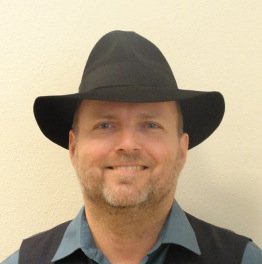Benjamin Owen, Ph.D

Research
I am a member of the LIGO Scientific Collaboration and Head of Observational Analysis for Cosmic Explorer, a planned improvement on LIGO. I am looking for students to work on both.With binary merger detections becoming routine, I am focused on the yet undetected signals that define the new frontier. Continuous waves present the greatest mathematical and computational challenges, their searches are most affected by electromagnetic astronomy, and they can tell us uniquely about the microphysics of dense matter; so they are the type that gets most of my attention these days. I am also interested in all sorts of novel signals, particularly those involving neutron stars.
I have been laying the foundations of gravitational wave astronomy since the days most people said it would never happen. I am one of the few people who has worked on all four types of signals (binary mergers, continuous waves, stochastic background, non-binary bursts), both theory and data analysis. LIGO's historic discoveries of binary mergers used my mathematical techniques for covering parameter space and evaluating waveform accuracy, and I have also worked on analytical and numerical waveforms. I discovered the most promising emission mechanisms for continuous waves, astrophysically guided many LIGO searches, and run big searches myself. Many types of LIGO burst searches bear my fingerprints, particularly searches for starquakes.
Brief Bio
2016 Special Breakthrough Prize (as part of the LIGO Scientific Collaboration)2015 faculty at Texas Tech
2013 Fellow of the American Physical Society
2002 faculty at Penn State
2000 postdoc at University of Wisconsin - Milwaukee
1998 postdoc at Max Planck Institute for Gravitational Physics
1998 Clauser Prize for Doctoral Thesis of the Year, Caltech
1998 PhD from Caltech, Advisor: Kip Thorne
1993 NSF Graduate Research Fellowship
1993 BS from Sonoma State University
2021-now member of the Cosmic Explorer consortium
1997-2019, 2022-now member of the LIGO Scientific Collaboration
Selected Publications
- B. J. Owen, L. Lindblom, and L. Soares Pinheiro, "First Constraining Upper Limits on Gravitational-wave Emission from NS 1987A in SNR
1987A," Astrophys. J. Lett. 935, L7 (2022). Featured in AAS Nova research highlights
- B. Rajbhandari, B. J. Owen, S. Caride, and R. Inta, "First search for gravitational waves from r-modes of the Crab pulsar," Phys. Rev. D 104, 122008 (2021)
- B. P. Abbott, et al. (LIGO Scientific Collaboration and Virgo Collaboration), "GW170817: Observation of Gravitational Waves From a Binary Neutron Star Inspiral," Phys. Rev. Lett. 119, 161101 (2017)
- B. P. Abbott, et al. (LIGO Scientific Collaboration and Virgo Collaboration), "Observation of gravitational waves from a binary black hole merger," Phys. Rev. Lett. 116, 061102 (2016)
- N. K. Johnson-McDaniel and B. J. Owen, "Maximum elastic deformations of relativistic stars," Phys. Rev. D 88, 044004 (2013)
- J. Abadie, et al. (LIGO Scientific Collaboration and Virgo Collaboration), "Search for gravitational wave bursts from six magnetars," Astrophys. J. 734, L35 (2011)
- L. Lindblom, B. J. Owen, and D. A. Brown, "Model waveform accuracy standards for gravitational wave data analysis," Phys. Rev. D 78, 124020 (2008)
- B. J. Owen, "Maximum elastic deformations of compact stars with exotic equations of state," Phys. Rev. Lett. 95, 211101 (2005)
- B. J. Owen, L. Lindblom, C. Cutler, B. F. Schutz, A. Vecchio, and N. Andersson, "Gravitational waves from hot young rapidly rotating neutron stars," Phys. Rev. D 58, 084020 (1998)
- B. J. Owen, "Search templates for gravitational waves from inspiraling binaries: Choice of template spacing," Phys. Rev. D 53, 6749 (1996)
Curriculum Vitae
My long form CV is available as a PDF.Department of Physics and Astronomy
-
Address
Texas Tech University, Department of Physics & Astronomy, Box 41051, Lubbock, TX 79409-1051 -
Phone
806.742.3767 | Fax: 806.742.1182 -
Email
physics.astronomy.webmasters@ttu.edu | physics.academic.advising@ttu.edu
